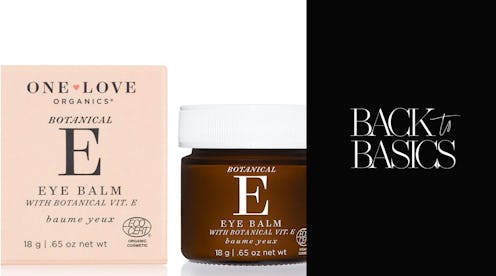(Beauty)
Here’s Why You’re Always Seeing Vitamin E In Skincare Products

With new product brands, launches, and categories popping up every day, beauty can be a bit overwhelming. Back to Basics, our new rudimentary beauty series, serves as your crash course on the science behind some of the best formulations in the game.
You've probably heard dermatologists and skincare enthusiasts singing the praises of vitamin C for treating acne scars, uneven skin tone, fine lines, and much more. If you've ever glanced at the label on your favorite vitamin C serum, you've likely spotted vitamin E (or tocopherol, the chemical compound for vitamin E) as one of the hero ingredients. Though it arguably doesn't receive as much recognition as vitamin C, implementing vitamin E in skincare is just as crucial.
First and foremost, there's a reason why vitamin C and vitamin E go hand-and-hand in skincare. "Vitamin C is a water-soluble vitamin, also an antioxidant known more for collagen stimulation," Dr. Diane Madfes, M.D., FAAD, a New York City-based dermatologist and Assistant Professor of Dermatology, Mount Sinai School of Medicine, tells TZR. "Vitamin C is a challenging antioxidant to keep stable in skin care products." The dermatologist says antioxidants only work to neutralize free radicals when they are in a reduced state (meaning not oxidized). Vitamin C oxidizes rapidly when exposed to air. Therefore, she says that vitamin E helps to stabilize vitamin C.
Dr. Elyse Love, a board-certified dermatologist at Spring Street Dermatology in New York, notes that the fat-soluble vitamin is naturally found in foods like avocados, olive oil, mangos, spinach, red peppers, and peanuts. Like a lot of vitamins that take on many forms, there are eight different types of vitamin E. Dr. Robert Finney, M.D., FAAD, a board certified dermatologist at Entière Dermatology in New York City, says that there are four subtypes (alpha, beta, delta, and gamma) in the tocopherol family, and four in the tocotrienol family. "Most of the time I have seen it topically available in the alpha-tocopherol form," Dr. Finney explains. "I am not sure if this is due to its stability in topical creams or that it is easier to synthesize." For example, he says that SkinCeuticals' popular C E Ferulic is formulated with 1% vitamin E (alpha-tocopherol).
Ready to dive into vitamin E? Keep scrolling to find out why and how you should be implementing the ingredient in your skincare routine.
Vitamin E In Skincare: The Benefits
Products containing vitamin E are best applied in the morning under your daily moisturizer with SPF. By doing so, Dr. Finney says it will offer extra protection against free radical damage created by the sun and air pollution. In turn, since free radicals are linked to dyspigmentation and early signs of aging, the dermatologist says there are claims that using a serum containing vitamin E leads to the decreasing of dark marks and wrinkles. When found in cream, Dr. Hope Mitchell, M.D., FAAD, the founder and CEO of Mitchell Dermatology in Perrysburg, Ohio, says it makes for an excellent moisturizer for dry skin.
Vitamin E In Skincare: The Products The Ingredient Its Used In
As vitamin E is fat and oil soluble, Dr. Love says it's only found in oil and cream products. "It has synergistic effects with vitamin C, so it is commonly found in formulations that also contain vitamin C," the dermatologist says. "It's also included in some sunscreens for its antioxidant properties, and some dry skincare products for its moisturizing properties."
Vitamin E In Skincare: Ingredients It Works Well With
Dr. Madfass notes that in general, vitamin E is a great complement to many skincare formulas as it's stable, has low irritancy, and helps to boost the properties of other ingredients. According to Dr. Finney, vitamin E stabilizes cell membranes and works synergistically with other anti-inflammatories such as aloe, squalene, alpha-lipoic acid (fatty acid), and cannabidiol (CBD). All these ingredients help to strengthen skin cells. Additionally, Dr. Finney says when vitamin E as an antioxidant stabilizer is combined with ferulic plant, a plant-based antioxidant or glutathione and vitamin C, the free radical ability is strengthened. "The result is better protection and repair," he says.
Vitamin E In Skincare: The Skin Types It Works Best On
Vitamin E might improve dry skin or flakiness associated with milder cases of eczema or psoriasis. "Because vitamin E can moisturize and soothe dry flaky skin, it may even help relieve the burning and itching from a sunburn," Dr. Mitchell notes. But as vitamin E is absorbed by the oil glands, she advises those with oily skin to avoid applying it to your face as it could clog pores and cause acne. And if you have sensitive or acne-prone skin, Dr. Love says to exercise with caution. "Since it can be irritating, vitamin E is best used in a single agent in the routine," she notes.
Now that you're an expert on vitamin E, discover all the miraculous benefits first-hand by shopping the skincare selection ahead.
We only include products that have been independently selected by The Zoe Report's editorial team. However, we may receive a portion of sales if you purchase a product through a link in this article.
Vitamin E In Serums
Vitamin E In Creams
Vitamin E In Eye Creams
This article was originally published on